Business Law: Legal Solutions and Company Establishment
VerifiedAdded on 2020/01/28
|13
|4121
|389
Report
AI Summary
This report examines the multifaceted nature of business law, focusing on its application within the UK legal framework. It begins by defining business law and its significance, followed by an exploration of the UK's legal systems, including English, Northern Ireland, and Scots law, and the roles of common and statutory law. The report analyzes the government's legislative processes, detailing the stages of a bill's passage through Parliament. Furthermore, it investigates the impact of contract and employment law on businesses through case studies, such as Stevens v University of Birmingham and AGC vs McWhirter. Finally, the report provides insights into establishing a company, outlining the necessary steps for registration, licensing, and compliance with legal requirements, offering practical legal solutions for business operations.

BUSINESS LAW
STUDENT’S NAME:
STUDENT’S ID:
PROFESSOR’S NAME:
1
STUDENT’S NAME:
STUDENT’S ID:
PROFESSOR’S NAME:
1
Paraphrase This Document
Need a fresh take? Get an instant paraphrase of this document with our AI Paraphraser

Table of contents
2
2
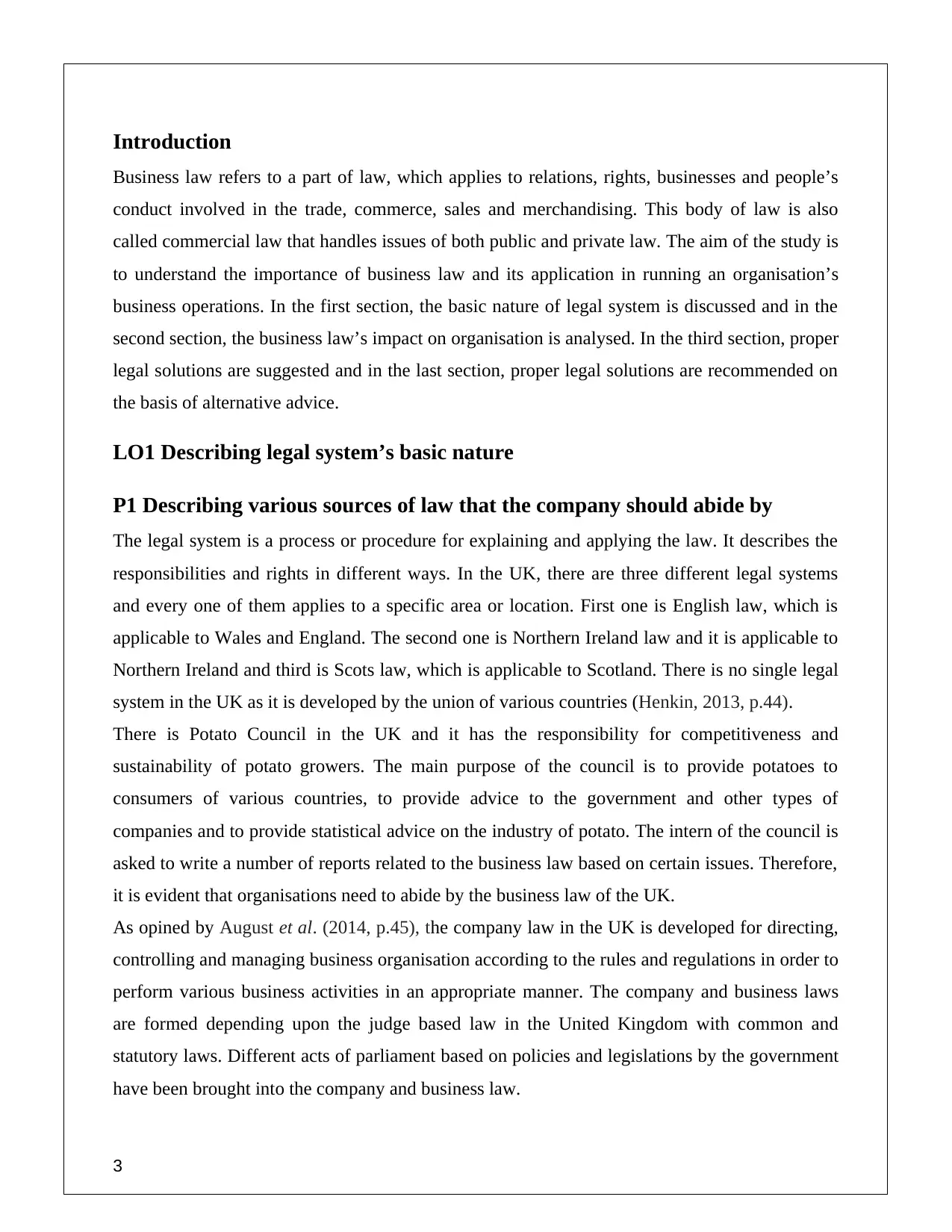
Introduction
Business law refers to a part of law, which applies to relations, rights, businesses and people’s
conduct involved in the trade, commerce, sales and merchandising. This body of law is also
called commercial law that handles issues of both public and private law. The aim of the study is
to understand the importance of business law and its application in running an organisation’s
business operations. In the first section, the basic nature of legal system is discussed and in the
second section, the business law’s impact on organisation is analysed. In the third section, proper
legal solutions are suggested and in the last section, proper legal solutions are recommended on
the basis of alternative advice.
LO1 Describing legal system’s basic nature
P1 Describing various sources of law that the company should abide by
The legal system is a process or procedure for explaining and applying the law. It describes the
responsibilities and rights in different ways. In the UK, there are three different legal systems
and every one of them applies to a specific area or location. First one is English law, which is
applicable to Wales and England. The second one is Northern Ireland law and it is applicable to
Northern Ireland and third is Scots law, which is applicable to Scotland. There is no single legal
system in the UK as it is developed by the union of various countries (Henkin, 2013, p.44).
There is Potato Council in the UK and it has the responsibility for competitiveness and
sustainability of potato growers. The main purpose of the council is to provide potatoes to
consumers of various countries, to provide advice to the government and other types of
companies and to provide statistical advice on the industry of potato. The intern of the council is
asked to write a number of reports related to the business law based on certain issues. Therefore,
it is evident that organisations need to abide by the business law of the UK.
As opined by August et al. (2014, p.45), the company law in the UK is developed for directing,
controlling and managing business organisation according to the rules and regulations in order to
perform various business activities in an appropriate manner. The company and business laws
are formed depending upon the judge based law in the United Kingdom with common and
statutory laws. Different acts of parliament based on policies and legislations by the government
have been brought into the company and business law.
3
Business law refers to a part of law, which applies to relations, rights, businesses and people’s
conduct involved in the trade, commerce, sales and merchandising. This body of law is also
called commercial law that handles issues of both public and private law. The aim of the study is
to understand the importance of business law and its application in running an organisation’s
business operations. In the first section, the basic nature of legal system is discussed and in the
second section, the business law’s impact on organisation is analysed. In the third section, proper
legal solutions are suggested and in the last section, proper legal solutions are recommended on
the basis of alternative advice.
LO1 Describing legal system’s basic nature
P1 Describing various sources of law that the company should abide by
The legal system is a process or procedure for explaining and applying the law. It describes the
responsibilities and rights in different ways. In the UK, there are three different legal systems
and every one of them applies to a specific area or location. First one is English law, which is
applicable to Wales and England. The second one is Northern Ireland law and it is applicable to
Northern Ireland and third is Scots law, which is applicable to Scotland. There is no single legal
system in the UK as it is developed by the union of various countries (Henkin, 2013, p.44).
There is Potato Council in the UK and it has the responsibility for competitiveness and
sustainability of potato growers. The main purpose of the council is to provide potatoes to
consumers of various countries, to provide advice to the government and other types of
companies and to provide statistical advice on the industry of potato. The intern of the council is
asked to write a number of reports related to the business law based on certain issues. Therefore,
it is evident that organisations need to abide by the business law of the UK.
As opined by August et al. (2014, p.45), the company law in the UK is developed for directing,
controlling and managing business organisation according to the rules and regulations in order to
perform various business activities in an appropriate manner. The company and business laws
are formed depending upon the judge based law in the United Kingdom with common and
statutory laws. Different acts of parliament based on policies and legislations by the government
have been brought into the company and business law.
3
⊘ This is a preview!⊘
Do you want full access?
Subscribe today to unlock all pages.

Trusted by 1+ million students worldwide
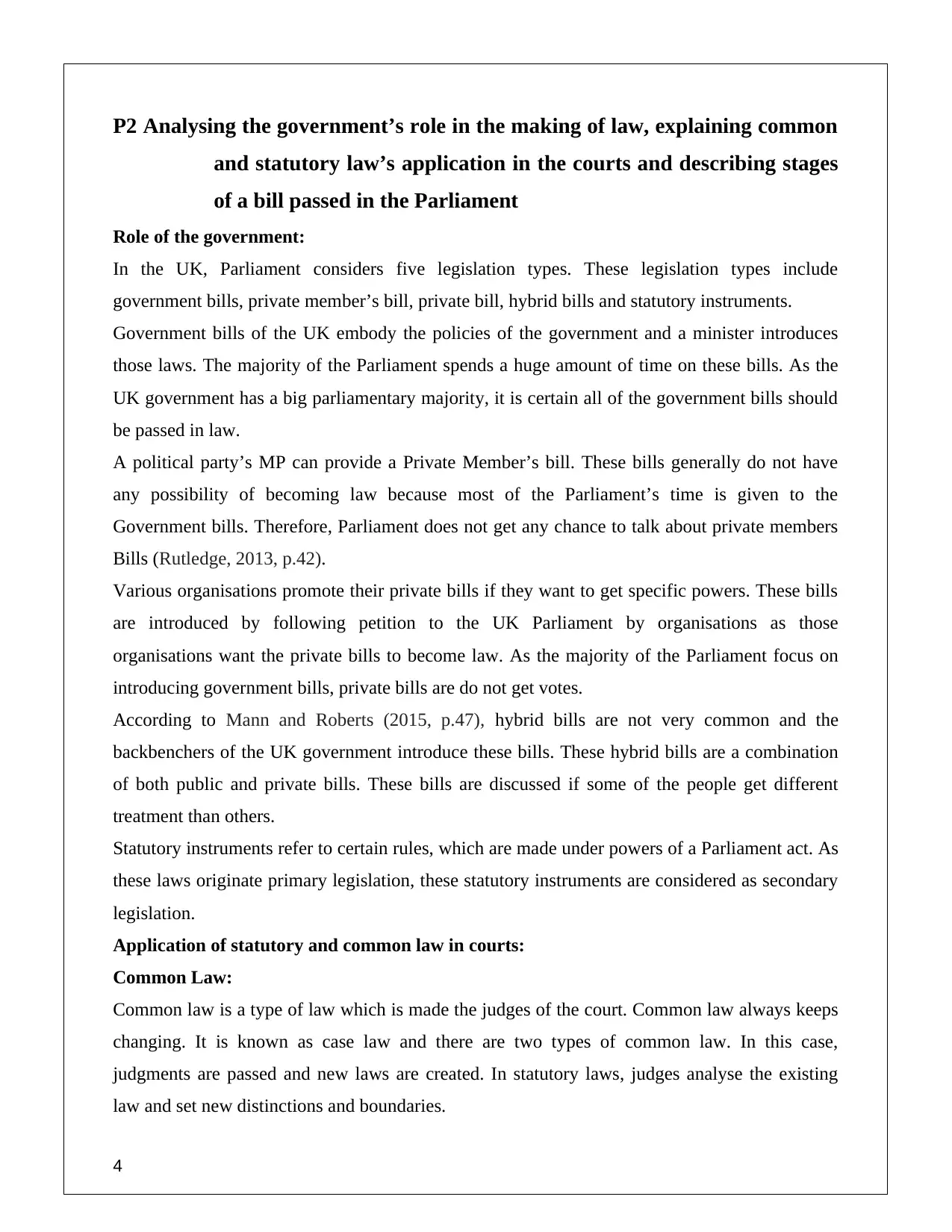
P2 Analysing the government’s role in the making of law, explaining common
and statutory law’s application in the courts and describing stages
of a bill passed in the Parliament
Role of the government:
In the UK, Parliament considers five legislation types. These legislation types include
government bills, private member’s bill, private bill, hybrid bills and statutory instruments.
Government bills of the UK embody the policies of the government and a minister introduces
those laws. The majority of the Parliament spends a huge amount of time on these bills. As the
UK government has a big parliamentary majority, it is certain all of the government bills should
be passed in law.
A political party’s MP can provide a Private Member’s bill. These bills generally do not have
any possibility of becoming law because most of the Parliament’s time is given to the
Government bills. Therefore, Parliament does not get any chance to talk about private members
Bills (Rutledge, 2013, p.42).
Various organisations promote their private bills if they want to get specific powers. These bills
are introduced by following petition to the UK Parliament by organisations as those
organisations want the private bills to become law. As the majority of the Parliament focus on
introducing government bills, private bills are do not get votes.
According to Mann and Roberts (2015, p.47), hybrid bills are not very common and the
backbenchers of the UK government introduce these bills. These hybrid bills are a combination
of both public and private bills. These bills are discussed if some of the people get different
treatment than others.
Statutory instruments refer to certain rules, which are made under powers of a Parliament act. As
these laws originate primary legislation, these statutory instruments are considered as secondary
legislation.
Application of statutory and common law in courts:
Common Law:
Common law is a type of law which is made the judges of the court. Common law always keeps
changing. It is known as case law and there are two types of common law. In this case,
judgments are passed and new laws are created. In statutory laws, judges analyse the existing
law and set new distinctions and boundaries.
4
and statutory law’s application in the courts and describing stages
of a bill passed in the Parliament
Role of the government:
In the UK, Parliament considers five legislation types. These legislation types include
government bills, private member’s bill, private bill, hybrid bills and statutory instruments.
Government bills of the UK embody the policies of the government and a minister introduces
those laws. The majority of the Parliament spends a huge amount of time on these bills. As the
UK government has a big parliamentary majority, it is certain all of the government bills should
be passed in law.
A political party’s MP can provide a Private Member’s bill. These bills generally do not have
any possibility of becoming law because most of the Parliament’s time is given to the
Government bills. Therefore, Parliament does not get any chance to talk about private members
Bills (Rutledge, 2013, p.42).
Various organisations promote their private bills if they want to get specific powers. These bills
are introduced by following petition to the UK Parliament by organisations as those
organisations want the private bills to become law. As the majority of the Parliament focus on
introducing government bills, private bills are do not get votes.
According to Mann and Roberts (2015, p.47), hybrid bills are not very common and the
backbenchers of the UK government introduce these bills. These hybrid bills are a combination
of both public and private bills. These bills are discussed if some of the people get different
treatment than others.
Statutory instruments refer to certain rules, which are made under powers of a Parliament act. As
these laws originate primary legislation, these statutory instruments are considered as secondary
legislation.
Application of statutory and common law in courts:
Common Law:
Common law is a type of law which is made the judges of the court. Common law always keeps
changing. It is known as case law and there are two types of common law. In this case,
judgments are passed and new laws are created. In statutory laws, judges analyse the existing
law and set new distinctions and boundaries.
4
Paraphrase This Document
Need a fresh take? Get an instant paraphrase of this document with our AI Paraphraser
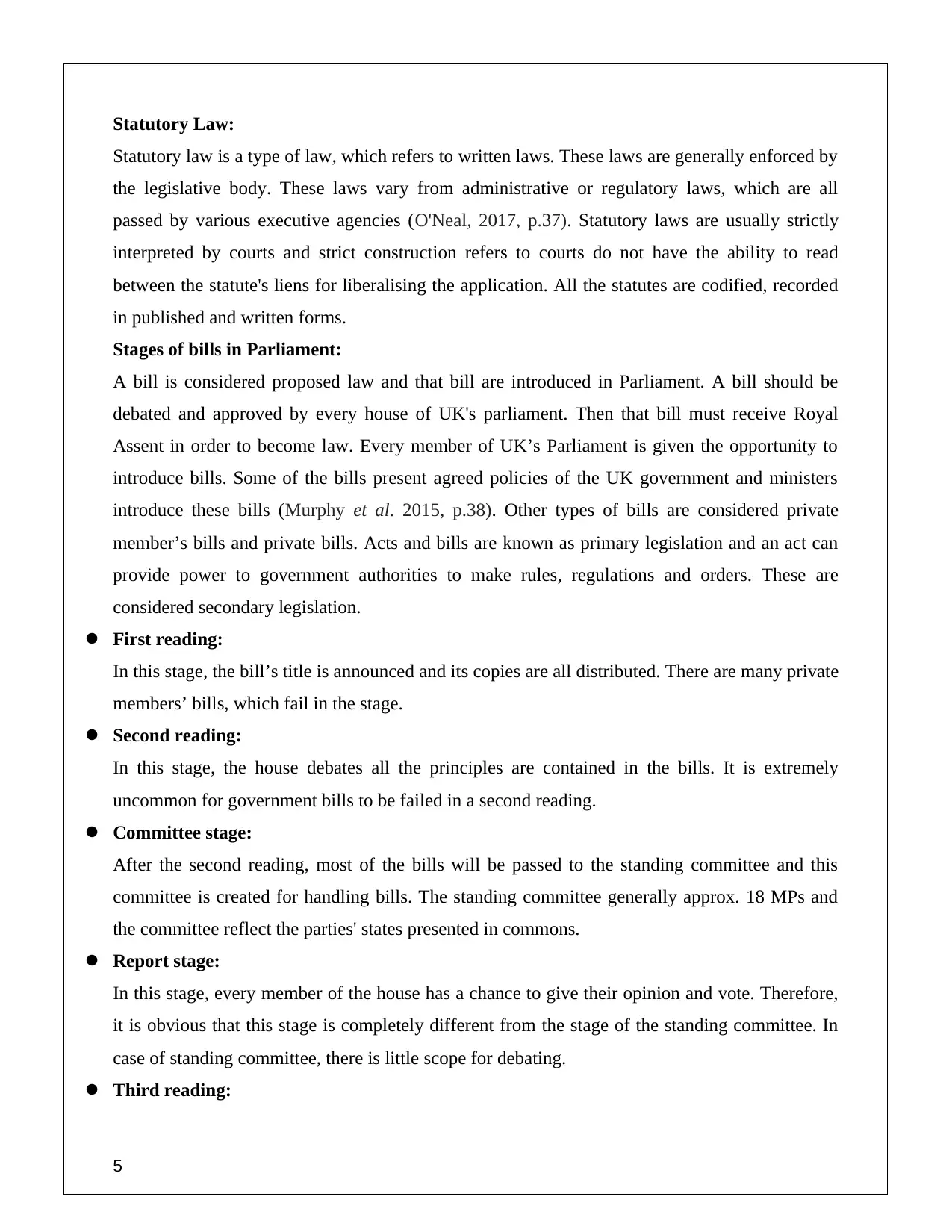
Statutory Law:
Statutory law is a type of law, which refers to written laws. These laws are generally enforced by
the legislative body. These laws vary from administrative or regulatory laws, which are all
passed by various executive agencies (O'Neal, 2017, p.37). Statutory laws are usually strictly
interpreted by courts and strict construction refers to courts do not have the ability to read
between the statute's liens for liberalising the application. All the statutes are codified, recorded
in published and written forms.
Stages of bills in Parliament:
A bill is considered proposed law and that bill are introduced in Parliament. A bill should be
debated and approved by every house of UK's parliament. Then that bill must receive Royal
Assent in order to become law. Every member of UK’s Parliament is given the opportunity to
introduce bills. Some of the bills present agreed policies of the UK government and ministers
introduce these bills (Murphy et al. 2015, p.38). Other types of bills are considered private
member’s bills and private bills. Acts and bills are known as primary legislation and an act can
provide power to government authorities to make rules, regulations and orders. These are
considered secondary legislation.
First reading:
In this stage, the bill’s title is announced and its copies are all distributed. There are many private
members’ bills, which fail in the stage.
Second reading:
In this stage, the house debates all the principles are contained in the bills. It is extremely
uncommon for government bills to be failed in a second reading.
Committee stage:
After the second reading, most of the bills will be passed to the standing committee and this
committee is created for handling bills. The standing committee generally approx. 18 MPs and
the committee reflect the parties' states presented in commons.
Report stage:
In this stage, every member of the house has a chance to give their opinion and vote. Therefore,
it is obvious that this stage is completely different from the stage of the standing committee. In
case of standing committee, there is little scope for debating.
Third reading:
5
Statutory law is a type of law, which refers to written laws. These laws are generally enforced by
the legislative body. These laws vary from administrative or regulatory laws, which are all
passed by various executive agencies (O'Neal, 2017, p.37). Statutory laws are usually strictly
interpreted by courts and strict construction refers to courts do not have the ability to read
between the statute's liens for liberalising the application. All the statutes are codified, recorded
in published and written forms.
Stages of bills in Parliament:
A bill is considered proposed law and that bill are introduced in Parliament. A bill should be
debated and approved by every house of UK's parliament. Then that bill must receive Royal
Assent in order to become law. Every member of UK’s Parliament is given the opportunity to
introduce bills. Some of the bills present agreed policies of the UK government and ministers
introduce these bills (Murphy et al. 2015, p.38). Other types of bills are considered private
member’s bills and private bills. Acts and bills are known as primary legislation and an act can
provide power to government authorities to make rules, regulations and orders. These are
considered secondary legislation.
First reading:
In this stage, the bill’s title is announced and its copies are all distributed. There are many private
members’ bills, which fail in the stage.
Second reading:
In this stage, the house debates all the principles are contained in the bills. It is extremely
uncommon for government bills to be failed in a second reading.
Committee stage:
After the second reading, most of the bills will be passed to the standing committee and this
committee is created for handling bills. The standing committee generally approx. 18 MPs and
the committee reflect the parties' states presented in commons.
Report stage:
In this stage, every member of the house has a chance to give their opinion and vote. Therefore,
it is obvious that this stage is completely different from the stage of the standing committee. In
case of standing committee, there is little scope for debating.
Third reading:
5
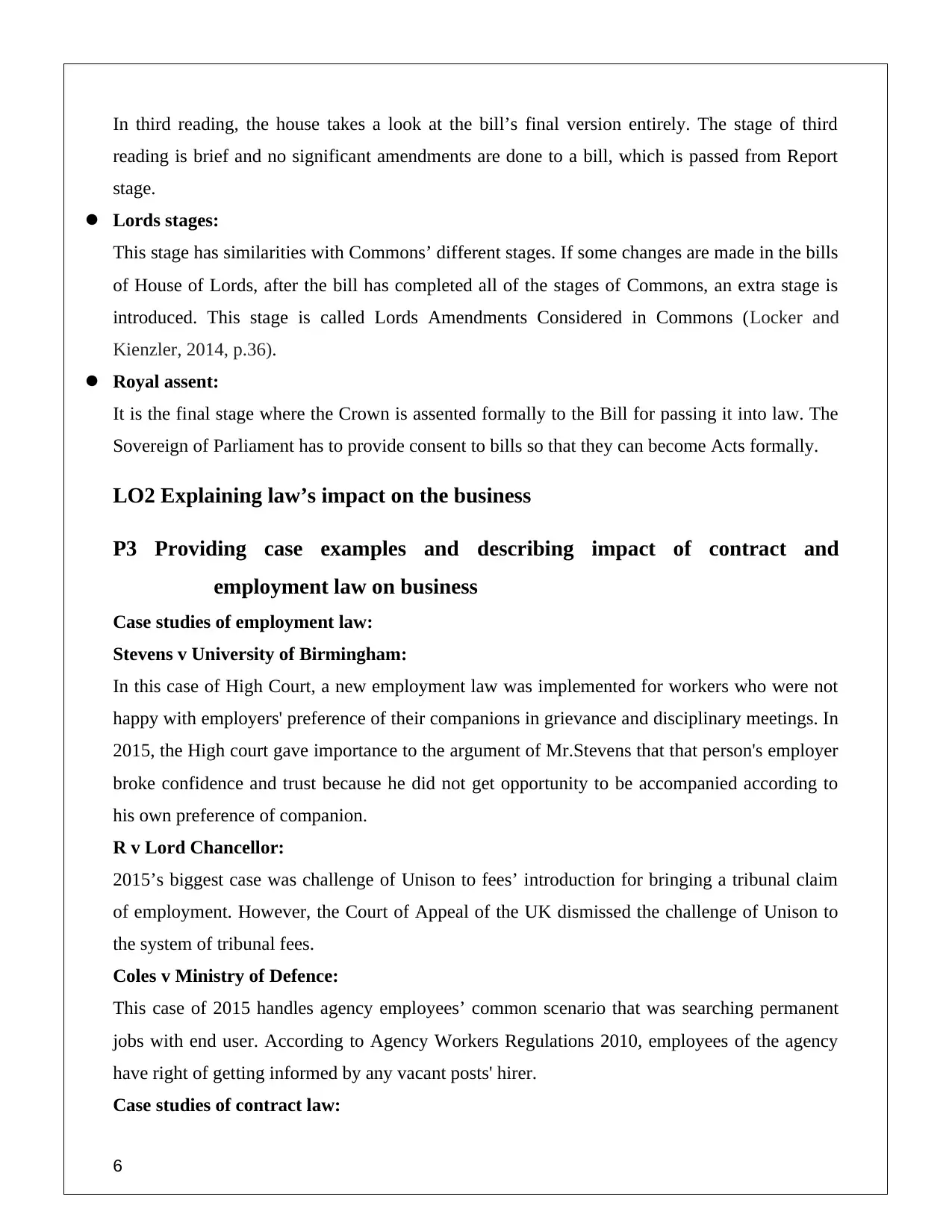
In third reading, the house takes a look at the bill’s final version entirely. The stage of third
reading is brief and no significant amendments are done to a bill, which is passed from Report
stage.
Lords stages:
This stage has similarities with Commons’ different stages. If some changes are made in the bills
of House of Lords, after the bill has completed all of the stages of Commons, an extra stage is
introduced. This stage is called Lords Amendments Considered in Commons (Locker and
Kienzler, 2014, p.36).
Royal assent:
It is the final stage where the Crown is assented formally to the Bill for passing it into law. The
Sovereign of Parliament has to provide consent to bills so that they can become Acts formally.
LO2 Explaining law’s impact on the business
P3 Providing case examples and describing impact of contract and
employment law on business
Case studies of employment law:
Stevens v University of Birmingham:
In this case of High Court, a new employment law was implemented for workers who were not
happy with employers' preference of their companions in grievance and disciplinary meetings. In
2015, the High court gave importance to the argument of Mr.Stevens that that person's employer
broke confidence and trust because he did not get opportunity to be accompanied according to
his own preference of companion.
R v Lord Chancellor:
2015’s biggest case was challenge of Unison to fees’ introduction for bringing a tribunal claim
of employment. However, the Court of Appeal of the UK dismissed the challenge of Unison to
the system of tribunal fees.
Coles v Ministry of Defence:
This case of 2015 handles agency employees’ common scenario that was searching permanent
jobs with end user. According to Agency Workers Regulations 2010, employees of the agency
have right of getting informed by any vacant posts' hirer.
Case studies of contract law:
6
reading is brief and no significant amendments are done to a bill, which is passed from Report
stage.
Lords stages:
This stage has similarities with Commons’ different stages. If some changes are made in the bills
of House of Lords, after the bill has completed all of the stages of Commons, an extra stage is
introduced. This stage is called Lords Amendments Considered in Commons (Locker and
Kienzler, 2014, p.36).
Royal assent:
It is the final stage where the Crown is assented formally to the Bill for passing it into law. The
Sovereign of Parliament has to provide consent to bills so that they can become Acts formally.
LO2 Explaining law’s impact on the business
P3 Providing case examples and describing impact of contract and
employment law on business
Case studies of employment law:
Stevens v University of Birmingham:
In this case of High Court, a new employment law was implemented for workers who were not
happy with employers' preference of their companions in grievance and disciplinary meetings. In
2015, the High court gave importance to the argument of Mr.Stevens that that person's employer
broke confidence and trust because he did not get opportunity to be accompanied according to
his own preference of companion.
R v Lord Chancellor:
2015’s biggest case was challenge of Unison to fees’ introduction for bringing a tribunal claim
of employment. However, the Court of Appeal of the UK dismissed the challenge of Unison to
the system of tribunal fees.
Coles v Ministry of Defence:
This case of 2015 handles agency employees’ common scenario that was searching permanent
jobs with end user. According to Agency Workers Regulations 2010, employees of the agency
have right of getting informed by any vacant posts' hirer.
Case studies of contract law:
6
⊘ This is a preview!⊘
Do you want full access?
Subscribe today to unlock all pages.

Trusted by 1+ million students worldwide
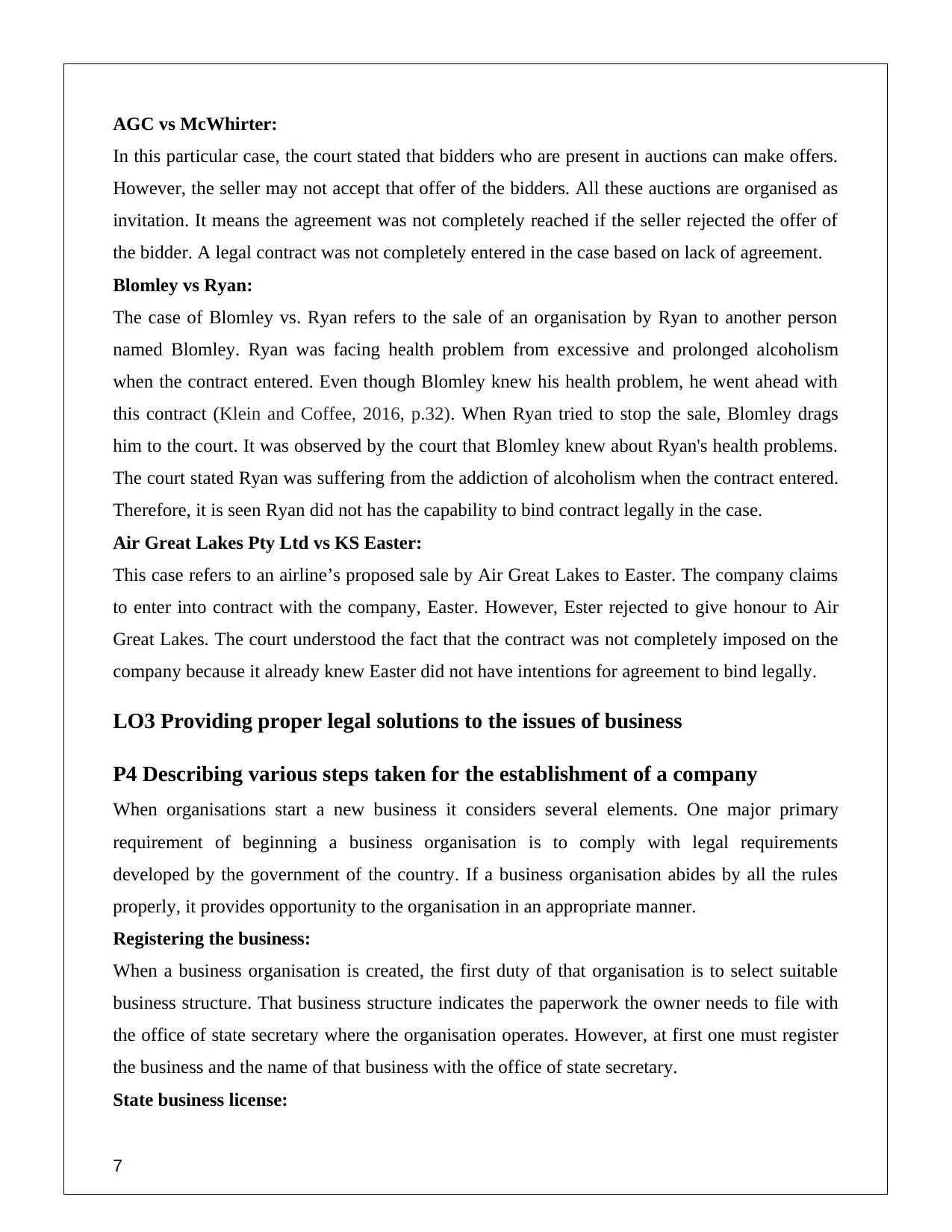
AGC vs McWhirter:
In this particular case, the court stated that bidders who are present in auctions can make offers.
However, the seller may not accept that offer of the bidders. All these auctions are organised as
invitation. It means the agreement was not completely reached if the seller rejected the offer of
the bidder. A legal contract was not completely entered in the case based on lack of agreement.
Blomley vs Ryan:
The case of Blomley vs. Ryan refers to the sale of an organisation by Ryan to another person
named Blomley. Ryan was facing health problem from excessive and prolonged alcoholism
when the contract entered. Even though Blomley knew his health problem, he went ahead with
this contract (Klein and Coffee, 2016, p.32). When Ryan tried to stop the sale, Blomley drags
him to the court. It was observed by the court that Blomley knew about Ryan's health problems.
The court stated Ryan was suffering from the addiction of alcoholism when the contract entered.
Therefore, it is seen Ryan did not has the capability to bind contract legally in the case.
Air Great Lakes Pty Ltd vs KS Easter:
This case refers to an airline’s proposed sale by Air Great Lakes to Easter. The company claims
to enter into contract with the company, Easter. However, Ester rejected to give honour to Air
Great Lakes. The court understood the fact that the contract was not completely imposed on the
company because it already knew Easter did not have intentions for agreement to bind legally.
LO3 Providing proper legal solutions to the issues of business
P4 Describing various steps taken for the establishment of a company
When organisations start a new business it considers several elements. One major primary
requirement of beginning a business organisation is to comply with legal requirements
developed by the government of the country. If a business organisation abides by all the rules
properly, it provides opportunity to the organisation in an appropriate manner.
Registering the business:
When a business organisation is created, the first duty of that organisation is to select suitable
business structure. That business structure indicates the paperwork the owner needs to file with
the office of state secretary where the organisation operates. However, at first one must register
the business and the name of that business with the office of state secretary.
State business license:
7
In this particular case, the court stated that bidders who are present in auctions can make offers.
However, the seller may not accept that offer of the bidders. All these auctions are organised as
invitation. It means the agreement was not completely reached if the seller rejected the offer of
the bidder. A legal contract was not completely entered in the case based on lack of agreement.
Blomley vs Ryan:
The case of Blomley vs. Ryan refers to the sale of an organisation by Ryan to another person
named Blomley. Ryan was facing health problem from excessive and prolonged alcoholism
when the contract entered. Even though Blomley knew his health problem, he went ahead with
this contract (Klein and Coffee, 2016, p.32). When Ryan tried to stop the sale, Blomley drags
him to the court. It was observed by the court that Blomley knew about Ryan's health problems.
The court stated Ryan was suffering from the addiction of alcoholism when the contract entered.
Therefore, it is seen Ryan did not has the capability to bind contract legally in the case.
Air Great Lakes Pty Ltd vs KS Easter:
This case refers to an airline’s proposed sale by Air Great Lakes to Easter. The company claims
to enter into contract with the company, Easter. However, Ester rejected to give honour to Air
Great Lakes. The court understood the fact that the contract was not completely imposed on the
company because it already knew Easter did not have intentions for agreement to bind legally.
LO3 Providing proper legal solutions to the issues of business
P4 Describing various steps taken for the establishment of a company
When organisations start a new business it considers several elements. One major primary
requirement of beginning a business organisation is to comply with legal requirements
developed by the government of the country. If a business organisation abides by all the rules
properly, it provides opportunity to the organisation in an appropriate manner.
Registering the business:
When a business organisation is created, the first duty of that organisation is to select suitable
business structure. That business structure indicates the paperwork the owner needs to file with
the office of state secretary where the organisation operates. However, at first one must register
the business and the name of that business with the office of state secretary.
State business license:
7
Paraphrase This Document
Need a fresh take? Get an instant paraphrase of this document with our AI Paraphraser
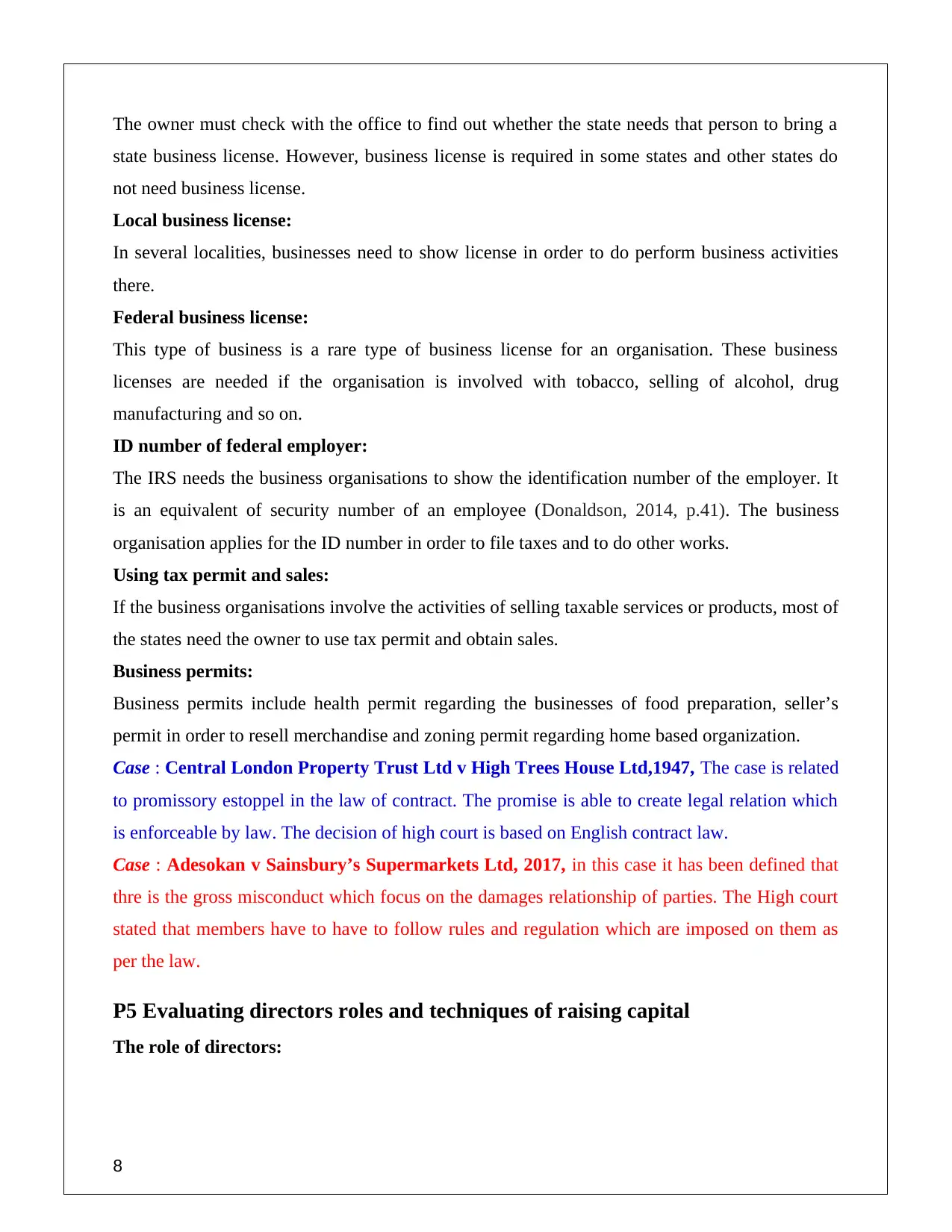
The owner must check with the office to find out whether the state needs that person to bring a
state business license. However, business license is required in some states and other states do
not need business license.
Local business license:
In several localities, businesses need to show license in order to do perform business activities
there.
Federal business license:
This type of business is a rare type of business license for an organisation. These business
licenses are needed if the organisation is involved with tobacco, selling of alcohol, drug
manufacturing and so on.
ID number of federal employer:
The IRS needs the business organisations to show the identification number of the employer. It
is an equivalent of security number of an employee (Donaldson, 2014, p.41). The business
organisation applies for the ID number in order to file taxes and to do other works.
Using tax permit and sales:
If the business organisations involve the activities of selling taxable services or products, most of
the states need the owner to use tax permit and obtain sales.
Business permits:
Business permits include health permit regarding the businesses of food preparation, seller’s
permit in order to resell merchandise and zoning permit regarding home based organization.
Case : Central London Property Trust Ltd v High Trees House Ltd,1947, The case is related
to promissory estoppel in the law of contract. The promise is able to create legal relation which
is enforceable by law. The decision of high court is based on English contract law.
Case : Adesokan v Sainsbury’s Supermarkets Ltd, 2017, in this case it has been defined that
thre is the gross misconduct which focus on the damages relationship of parties. The High court
stated that members have to have to follow rules and regulation which are imposed on them as
per the law.
P5 Evaluating directors roles and techniques of raising capital
The role of directors:
8
state business license. However, business license is required in some states and other states do
not need business license.
Local business license:
In several localities, businesses need to show license in order to do perform business activities
there.
Federal business license:
This type of business is a rare type of business license for an organisation. These business
licenses are needed if the organisation is involved with tobacco, selling of alcohol, drug
manufacturing and so on.
ID number of federal employer:
The IRS needs the business organisations to show the identification number of the employer. It
is an equivalent of security number of an employee (Donaldson, 2014, p.41). The business
organisation applies for the ID number in order to file taxes and to do other works.
Using tax permit and sales:
If the business organisations involve the activities of selling taxable services or products, most of
the states need the owner to use tax permit and obtain sales.
Business permits:
Business permits include health permit regarding the businesses of food preparation, seller’s
permit in order to resell merchandise and zoning permit regarding home based organization.
Case : Central London Property Trust Ltd v High Trees House Ltd,1947, The case is related
to promissory estoppel in the law of contract. The promise is able to create legal relation which
is enforceable by law. The decision of high court is based on English contract law.
Case : Adesokan v Sainsbury’s Supermarkets Ltd, 2017, in this case it has been defined that
thre is the gross misconduct which focus on the damages relationship of parties. The High court
stated that members have to have to follow rules and regulation which are imposed on them as
per the law.
P5 Evaluating directors roles and techniques of raising capital
The role of directors:
8
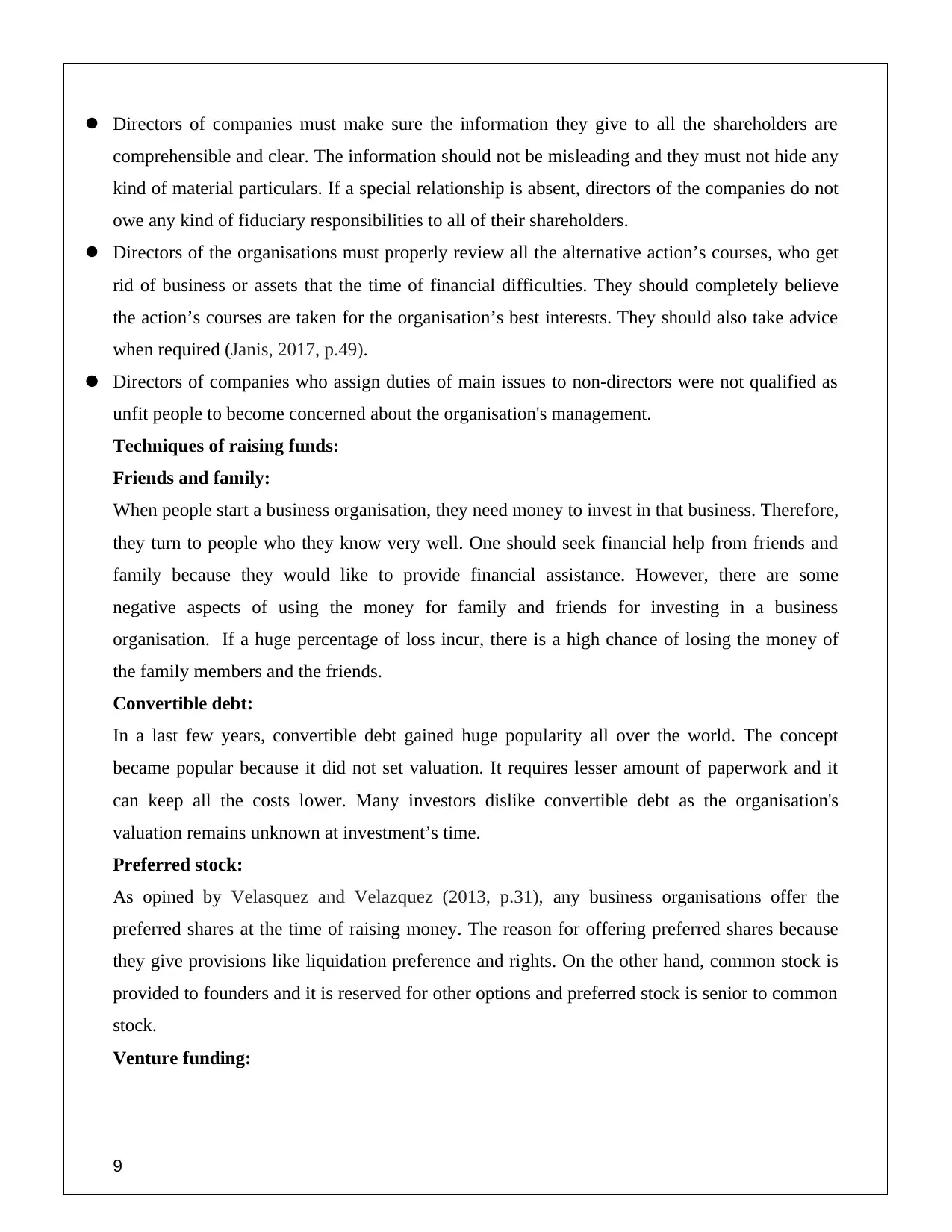
Directors of companies must make sure the information they give to all the shareholders are
comprehensible and clear. The information should not be misleading and they must not hide any
kind of material particulars. If a special relationship is absent, directors of the companies do not
owe any kind of fiduciary responsibilities to all of their shareholders.
Directors of the organisations must properly review all the alternative action’s courses, who get
rid of business or assets that the time of financial difficulties. They should completely believe
the action’s courses are taken for the organisation’s best interests. They should also take advice
when required (Janis, 2017, p.49).
Directors of companies who assign duties of main issues to non-directors were not qualified as
unfit people to become concerned about the organisation's management.
Techniques of raising funds:
Friends and family:
When people start a business organisation, they need money to invest in that business. Therefore,
they turn to people who they know very well. One should seek financial help from friends and
family because they would like to provide financial assistance. However, there are some
negative aspects of using the money for family and friends for investing in a business
organisation. If a huge percentage of loss incur, there is a high chance of losing the money of
the family members and the friends.
Convertible debt:
In a last few years, convertible debt gained huge popularity all over the world. The concept
became popular because it did not set valuation. It requires lesser amount of paperwork and it
can keep all the costs lower. Many investors dislike convertible debt as the organisation's
valuation remains unknown at investment’s time.
Preferred stock:
As opined by Velasquez and Velazquez (2013, p.31), any business organisations offer the
preferred shares at the time of raising money. The reason for offering preferred shares because
they give provisions like liquidation preference and rights. On the other hand, common stock is
provided to founders and it is reserved for other options and preferred stock is senior to common
stock.
Venture funding:
9
comprehensible and clear. The information should not be misleading and they must not hide any
kind of material particulars. If a special relationship is absent, directors of the companies do not
owe any kind of fiduciary responsibilities to all of their shareholders.
Directors of the organisations must properly review all the alternative action’s courses, who get
rid of business or assets that the time of financial difficulties. They should completely believe
the action’s courses are taken for the organisation’s best interests. They should also take advice
when required (Janis, 2017, p.49).
Directors of companies who assign duties of main issues to non-directors were not qualified as
unfit people to become concerned about the organisation's management.
Techniques of raising funds:
Friends and family:
When people start a business organisation, they need money to invest in that business. Therefore,
they turn to people who they know very well. One should seek financial help from friends and
family because they would like to provide financial assistance. However, there are some
negative aspects of using the money for family and friends for investing in a business
organisation. If a huge percentage of loss incur, there is a high chance of losing the money of
the family members and the friends.
Convertible debt:
In a last few years, convertible debt gained huge popularity all over the world. The concept
became popular because it did not set valuation. It requires lesser amount of paperwork and it
can keep all the costs lower. Many investors dislike convertible debt as the organisation's
valuation remains unknown at investment’s time.
Preferred stock:
As opined by Velasquez and Velazquez (2013, p.31), any business organisations offer the
preferred shares at the time of raising money. The reason for offering preferred shares because
they give provisions like liquidation preference and rights. On the other hand, common stock is
provided to founders and it is reserved for other options and preferred stock is senior to common
stock.
Venture funding:
9
⊘ This is a preview!⊘
Do you want full access?
Subscribe today to unlock all pages.

Trusted by 1+ million students worldwide
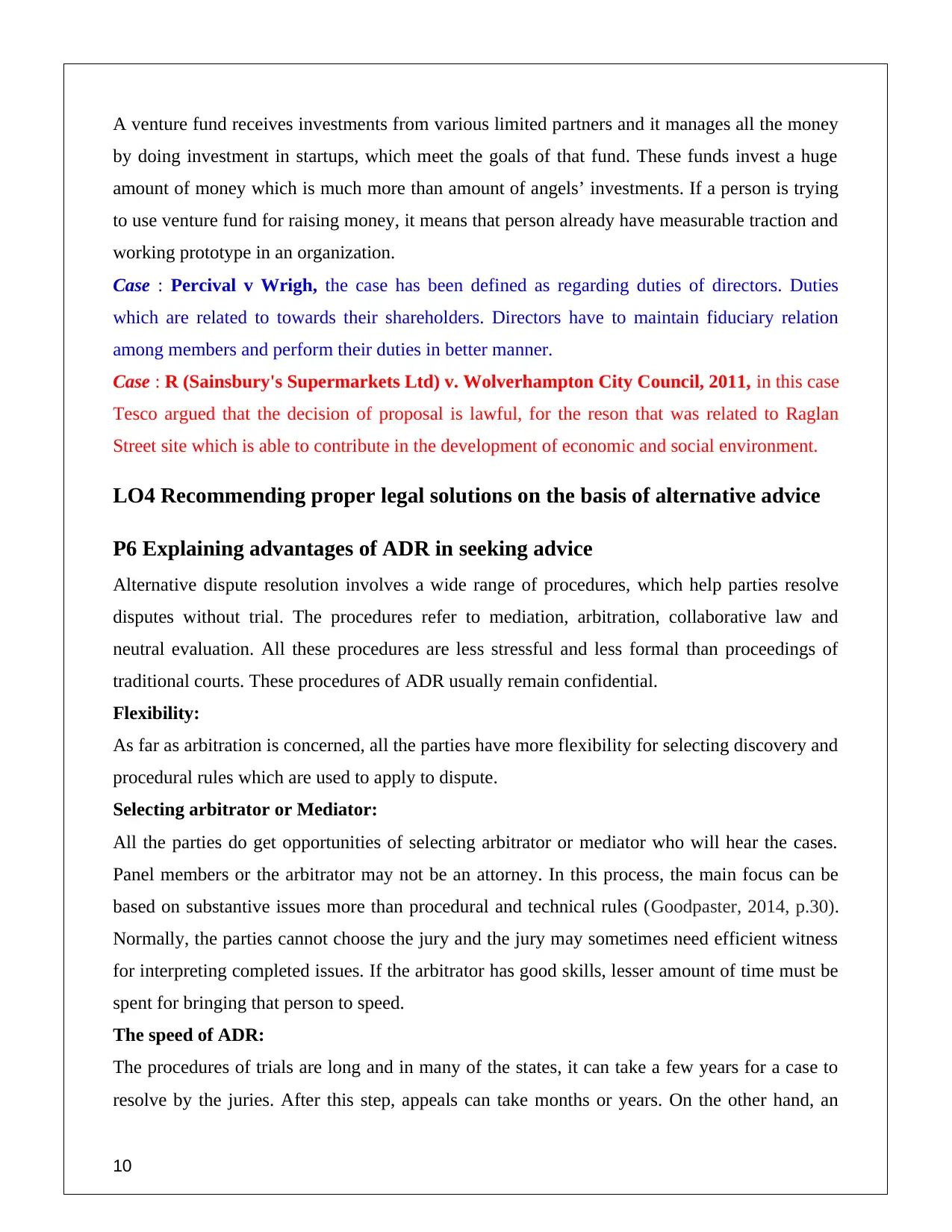
A venture fund receives investments from various limited partners and it manages all the money
by doing investment in startups, which meet the goals of that fund. These funds invest a huge
amount of money which is much more than amount of angels’ investments. If a person is trying
to use venture fund for raising money, it means that person already have measurable traction and
working prototype in an organization.
Case : Percival v Wrigh, the case has been defined as regarding duties of directors. Duties
which are related to towards their shareholders. Directors have to maintain fiduciary relation
among members and perform their duties in better manner.
Case : R (Sainsbury's Supermarkets Ltd) v. Wolverhampton City Council, 2011, in this case
Tesco argued that the decision of proposal is lawful, for the reson that was related to Raglan
Street site which is able to contribute in the development of economic and social environment.
LO4 Recommending proper legal solutions on the basis of alternative advice
P6 Explaining advantages of ADR in seeking advice
Alternative dispute resolution involves a wide range of procedures, which help parties resolve
disputes without trial. The procedures refer to mediation, arbitration, collaborative law and
neutral evaluation. All these procedures are less stressful and less formal than proceedings of
traditional courts. These procedures of ADR usually remain confidential.
Flexibility:
As far as arbitration is concerned, all the parties have more flexibility for selecting discovery and
procedural rules which are used to apply to dispute.
Selecting arbitrator or Mediator:
All the parties do get opportunities of selecting arbitrator or mediator who will hear the cases.
Panel members or the arbitrator may not be an attorney. In this process, the main focus can be
based on substantive issues more than procedural and technical rules (Goodpaster, 2014, p.30).
Normally, the parties cannot choose the jury and the jury may sometimes need efficient witness
for interpreting completed issues. If the arbitrator has good skills, lesser amount of time must be
spent for bringing that person to speed.
The speed of ADR:
The procedures of trials are long and in many of the states, it can take a few years for a case to
resolve by the juries. After this step, appeals can take months or years. On the other hand, an
10
by doing investment in startups, which meet the goals of that fund. These funds invest a huge
amount of money which is much more than amount of angels’ investments. If a person is trying
to use venture fund for raising money, it means that person already have measurable traction and
working prototype in an organization.
Case : Percival v Wrigh, the case has been defined as regarding duties of directors. Duties
which are related to towards their shareholders. Directors have to maintain fiduciary relation
among members and perform their duties in better manner.
Case : R (Sainsbury's Supermarkets Ltd) v. Wolverhampton City Council, 2011, in this case
Tesco argued that the decision of proposal is lawful, for the reson that was related to Raglan
Street site which is able to contribute in the development of economic and social environment.
LO4 Recommending proper legal solutions on the basis of alternative advice
P6 Explaining advantages of ADR in seeking advice
Alternative dispute resolution involves a wide range of procedures, which help parties resolve
disputes without trial. The procedures refer to mediation, arbitration, collaborative law and
neutral evaluation. All these procedures are less stressful and less formal than proceedings of
traditional courts. These procedures of ADR usually remain confidential.
Flexibility:
As far as arbitration is concerned, all the parties have more flexibility for selecting discovery and
procedural rules which are used to apply to dispute.
Selecting arbitrator or Mediator:
All the parties do get opportunities of selecting arbitrator or mediator who will hear the cases.
Panel members or the arbitrator may not be an attorney. In this process, the main focus can be
based on substantive issues more than procedural and technical rules (Goodpaster, 2014, p.30).
Normally, the parties cannot choose the jury and the jury may sometimes need efficient witness
for interpreting completed issues. If the arbitrator has good skills, lesser amount of time must be
spent for bringing that person to speed.
The speed of ADR:
The procedures of trials are long and in many of the states, it can take a few years for a case to
resolve by the juries. After this step, appeals can take months or years. On the other hand, an
10
Paraphrase This Document
Need a fresh take? Get an instant paraphrase of this document with our AI Paraphraser
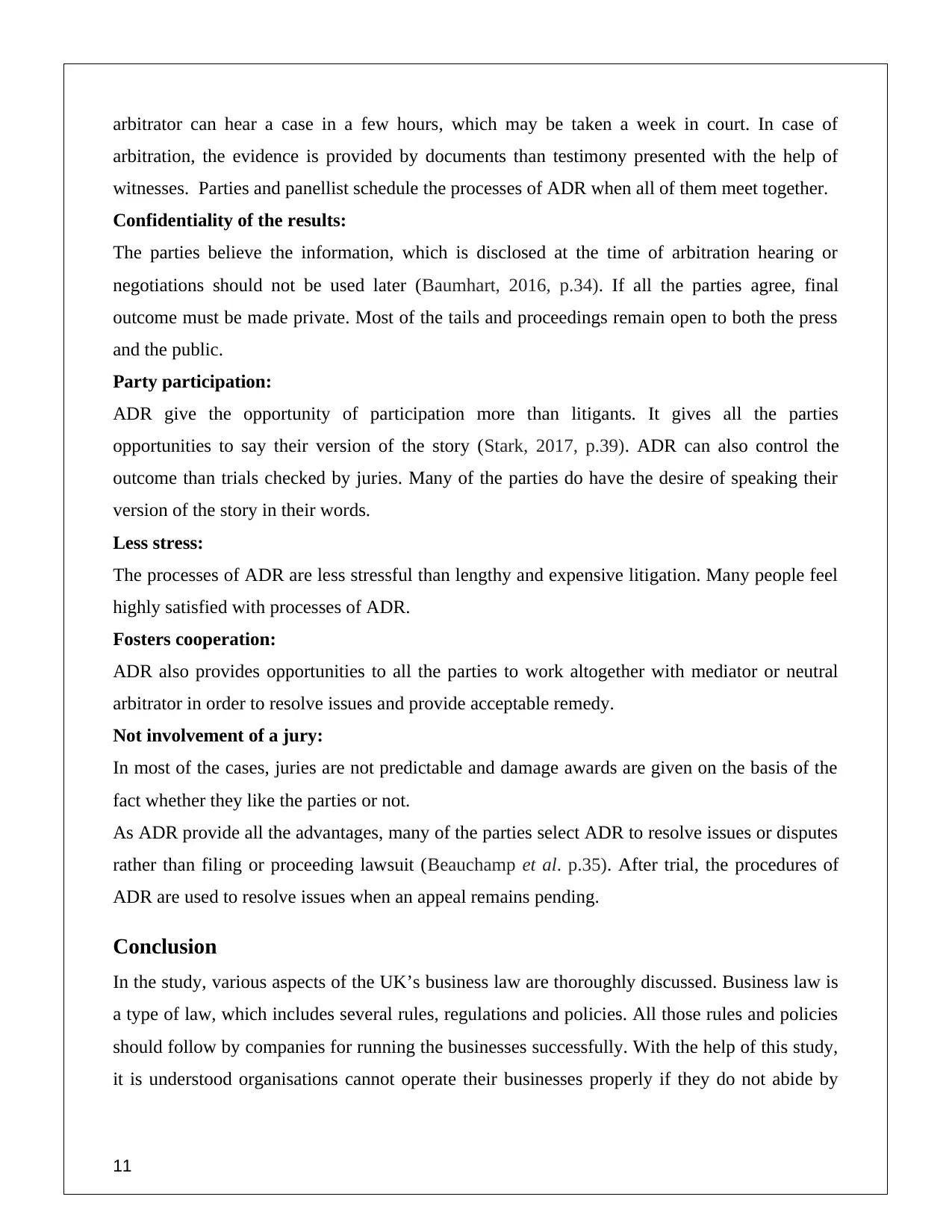
arbitrator can hear a case in a few hours, which may be taken a week in court. In case of
arbitration, the evidence is provided by documents than testimony presented with the help of
witnesses. Parties and panellist schedule the processes of ADR when all of them meet together.
Confidentiality of the results:
The parties believe the information, which is disclosed at the time of arbitration hearing or
negotiations should not be used later (Baumhart, 2016, p.34). If all the parties agree, final
outcome must be made private. Most of the tails and proceedings remain open to both the press
and the public.
Party participation:
ADR give the opportunity of participation more than litigants. It gives all the parties
opportunities to say their version of the story (Stark, 2017, p.39). ADR can also control the
outcome than trials checked by juries. Many of the parties do have the desire of speaking their
version of the story in their words.
Less stress:
The processes of ADR are less stressful than lengthy and expensive litigation. Many people feel
highly satisfied with processes of ADR.
Fosters cooperation:
ADR also provides opportunities to all the parties to work altogether with mediator or neutral
arbitrator in order to resolve issues and provide acceptable remedy.
Not involvement of a jury:
In most of the cases, juries are not predictable and damage awards are given on the basis of the
fact whether they like the parties or not.
As ADR provide all the advantages, many of the parties select ADR to resolve issues or disputes
rather than filing or proceeding lawsuit (Beauchamp et al. p.35). After trial, the procedures of
ADR are used to resolve issues when an appeal remains pending.
Conclusion
In the study, various aspects of the UK’s business law are thoroughly discussed. Business law is
a type of law, which includes several rules, regulations and policies. All those rules and policies
should follow by companies for running the businesses successfully. With the help of this study,
it is understood organisations cannot operate their businesses properly if they do not abide by
11
arbitration, the evidence is provided by documents than testimony presented with the help of
witnesses. Parties and panellist schedule the processes of ADR when all of them meet together.
Confidentiality of the results:
The parties believe the information, which is disclosed at the time of arbitration hearing or
negotiations should not be used later (Baumhart, 2016, p.34). If all the parties agree, final
outcome must be made private. Most of the tails and proceedings remain open to both the press
and the public.
Party participation:
ADR give the opportunity of participation more than litigants. It gives all the parties
opportunities to say their version of the story (Stark, 2017, p.39). ADR can also control the
outcome than trials checked by juries. Many of the parties do have the desire of speaking their
version of the story in their words.
Less stress:
The processes of ADR are less stressful than lengthy and expensive litigation. Many people feel
highly satisfied with processes of ADR.
Fosters cooperation:
ADR also provides opportunities to all the parties to work altogether with mediator or neutral
arbitrator in order to resolve issues and provide acceptable remedy.
Not involvement of a jury:
In most of the cases, juries are not predictable and damage awards are given on the basis of the
fact whether they like the parties or not.
As ADR provide all the advantages, many of the parties select ADR to resolve issues or disputes
rather than filing or proceeding lawsuit (Beauchamp et al. p.35). After trial, the procedures of
ADR are used to resolve issues when an appeal remains pending.
Conclusion
In the study, various aspects of the UK’s business law are thoroughly discussed. Business law is
a type of law, which includes several rules, regulations and policies. All those rules and policies
should follow by companies for running the businesses successfully. With the help of this study,
it is understood organisations cannot operate their businesses properly if they do not abide by
11

Business law. Most of these laws are created by the government of the UK and some interesting
case studies are discussed in the study. The advantage of Alternative Dispute Resolution is also
understood with the help of study. Therefore, it can be concluded that business law plays
significant role in the success of a business organisation. Companies do not face legal issues if
follow all the rules and regulations appropriately.
12
case studies are discussed in the study. The advantage of Alternative Dispute Resolution is also
understood with the help of study. Therefore, it can be concluded that business law plays
significant role in the success of a business organisation. Companies do not face legal issues if
follow all the rules and regulations appropriately.
12
⊘ This is a preview!⊘
Do you want full access?
Subscribe today to unlock all pages.

Trusted by 1+ million students worldwide
1 out of 13
Related Documents
Your All-in-One AI-Powered Toolkit for Academic Success.
+13062052269
info@desklib.com
Available 24*7 on WhatsApp / Email
![[object Object]](/_next/static/media/star-bottom.7253800d.svg)
Unlock your academic potential
Copyright © 2020–2026 A2Z Services. All Rights Reserved. Developed and managed by ZUCOL.





